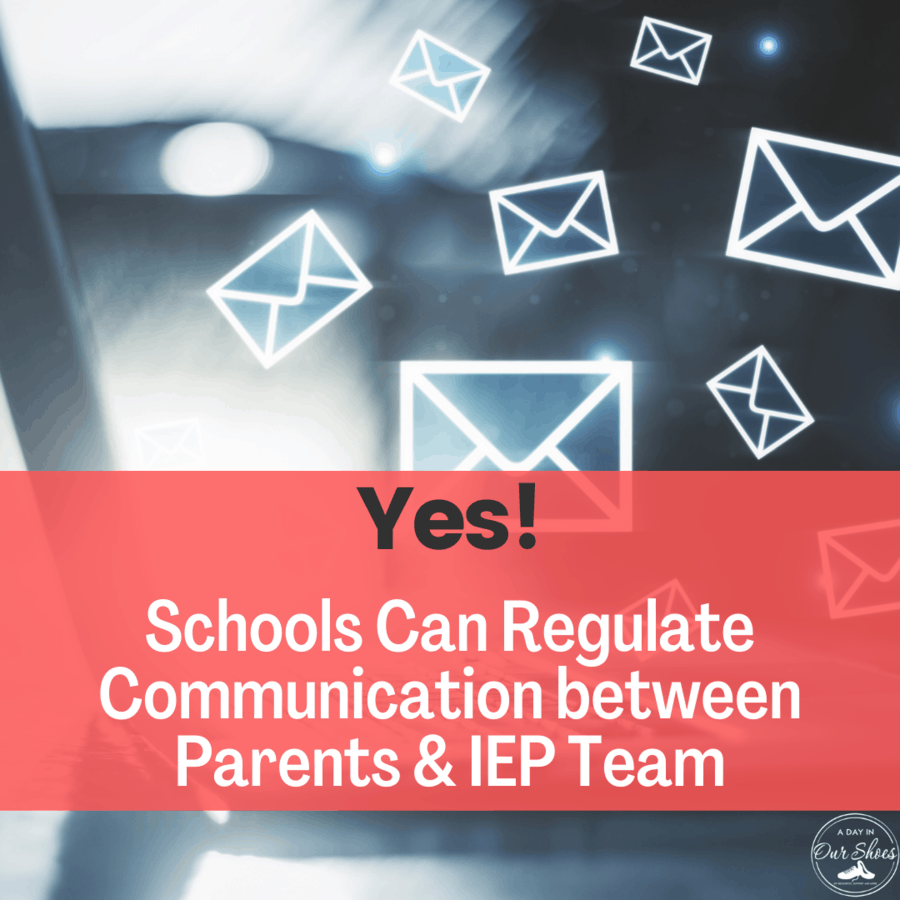Did your IEP Team Put you on a Parent Communication Plan? Yes, they can do that.
I remember I was working with this client one time. We had held an IEP meeting, and we were wrapping up a few loose ends. Together we drafted an email to send to the IEP team, and she (parent) sent it from her email.
She then forwarded it to me. I responded with, “Looks great, if we don’t hear anything from them in 5-7 days, give them a nudge.”

She responded to me with “Really? I was only going to give them until 2 pm.”
Mind you, this was a little before lunch time.
Sigh.
Communication Plan for Parents
It comes up in my chat group every once in a while. An IEP team or someone from the school district will tell the parent that there is some type of communication plan in place.
These IEP communication plans usually include:
- Dictates that all communication regarding the child’s IEP should go through one person, who will then disseminate the information to the team.
- Outlines a time frame for how often the parent can or should email those concerns.
- Outlines the method of communication (weekly phone call, weekly email, etc.)
- Outlines a time frame of when the parent should expect a response to their concerns.
So this is how it usually plays out in the group. A parent posts a scenario that includes the bullet points above. That parent asks “Can they do this?”
And as usual…never a shortage of bad advice in IEP land. There is almost always a chorus of “that’s illegal!” and “they are violating your rights!”
Well, no. They’re not. Let’s dig in.
Communicating with your IEP Team
I have previously done posts about communicating with your IEP team. I’m not going to get into the specifics of IEP letter writing or sending out a professional email to your IEP team. You can review those posts below.
- {IEP and Email} What to Know Before You Click “Send.”
- How and When to Write to your IEP Team | IEP Letter Templates | 504
Let’s talk about urgency.
Believe me when I say “I get it!” My son has been in situations that I wanted resolved NOW. YESTERDAY.
A few years ago, there was another young man on his special education bus who was targeting him. He broke K’s seizure helmet, he hit him a few times and would grab him.
There were periods of time that I had to drive K to school because I didn’t think he was safe. And, I was emailing everyone–the entire IEP team, transportation director and so on.
I truly understand the sense of urgency that comes with some IEP issues, particularly when you child might be harmed.
However, that sense of urgency should not outweigh your ability to remain professional.
If you have outlined your concerns in a well written, well thought out email, let it be. Sending 10 more is not going to help the situation.
What IDEA Says About Parent Communication
First, you’re not going to find this specific issue defined in IDEA or state regs. IDEA has not defined “communication plans” specifically. However, IDEA defines parent participation in the IEP process.
And Parent Participation is mentioned numerous times. Enough times that it obviously was an important issue to the folks who rewrote the IDEA reauthorization.
A school cannot deny you meaningful participation in the IEP process. You are permitted to submit IEP parent concerns. A parent can request an IEP meeting to discuss IEP concerns and a school is required to provide you with a PWN if they decline to hold the meeting.
A school district cannot make changes to an IEP without parent consent.
However, it is completely legal, and case law has upheld this, that a school district can have a defined communication plan for IEP parents.
ESSA and Parent Communication
I have another post about IEP parents observing the special education classroom. ESSA is the law that applies in that circumstance, and it applies here too.
ESSA talks about IEP parents and their right to participate “in regular, two-way, and meaningful communication involving student academic learning and other school activities” and “play an integral role in assisting their child’s learning.”
To do this, parents are ‘encouraged to be actively involved in their child’s education at school . . . and carry out of other activities, such as those described in section 1116.’
The activities referenced in section 1116 state that parents may engage in to participate in their child’s education include (but not limited to) ongoing communications between teachers and parents and classroom observation.
All of this to say….if you wish to override a communication plan, then it must be done via the IEP process. Submit a parent concerns letter and follow up with a PWN.
What to Look for in your Parent Communication Plan
The key is to examine whether or not you are being provided the opportunity to meaningfully participate in your child’s IEP development and progress monitoring. That doesn’t mean 8 emails a day.
This also means that you cannot go in to the school in person and demand meetings on the spot, another thing I’ve seen parents do.
I also would try and determine if this rule applies to all parents or just a few. Perhaps just the Black parents? Or just the non-English speaking parents? Discrimination issues can still occur.
And, of course, reflect on your own behavior. Were you emailing the various team members frequently? What is your definition of a reasonable amount of time, compared to what the school’s definition is? Expecting a response a few hours later is not reasonable, in my professional opinion.
Most teachers are planners. And most have a pretty strict schedule to adhere to. Having a communication plan enables teams to be more efficient.
Of course, emergencies come up! But not every IEP crisis is an emergency. You want to be a respected, valued member of the IEP team. Not a nuisance. Maintaining professional email communication with your team, only when necessary, is one way to achieve that.
There’s a reason I named this site “A Day in our Shoes.” We all need to spend a day in each other’s shoes. Most of us know what it’s like to be overwhelmed at work and inundated with constant emails.
Especially when those emails don’t say anything new! A second, third, or more subsequent email rarely helps a situation.
Read the tips in the above linked posts, and if you have any other questions, join our Facebook group and ask.
Lastly, here is one recent Due Process hearing decision about this.
I hope this helps! You can always email us with other suggestions and questions.
Communication Tips and Resources
- Did your IEP Team Put you on a Parent Communication Plan? Yes, they can do that.
- 10 Free Daily Communication Logs for Special Education: Parent-Teacher and Home-School
- How To Write an IEP Parent Concerns Letter that Gets Results (Examples)
- IEP Meeting Checklist for Teachers ( Free PDF)
- Communicating for Success: Tips to Strengthen Parent-Teacher Relationships in IEPs (Parent Teacher Communication)
- Can IEPs be Emailed? And 11 Other IEP Email FAQs.
- IEPs and Email: What to Know Before You Click “Send.”

